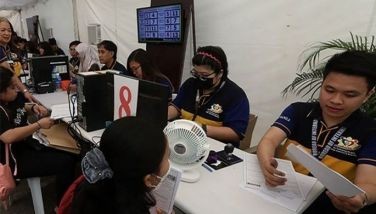Digital world catch-up

It has become quite apparent from our own experiences and that of other countries during the coronavirus disease 2019 or COVID-19 pandemic that governments are becoming increasingly reliant on digital technologies to fight the pandemic and mitigate its impact on society and the economy.
We have seen in other countries how digital systems were employed to control and contain the pandemic for, among other things, contact tracing, quarantine, testing, modeling using artificial intelligence, and logistics. For consumers and businesses large and small, the internet provided a lifeline for them to continue to purchase or supply goods and services with mobility being restricted. For government, it provided them the basis to more effectively distribute financial aid for social amelioration and for keeping businesses particularly SMEs afloat.
Countries with greater adoption of digital financial services meant traditional banking services could be accessed remotely and thus enable them to take advantage of tele-medicine, e-commerce and advanced education delivery systems.
Beyond the immediate need of containing the pandemic and minimizing the social and economic impacts, the digital readiness of the country will have a bearing on how the economy can recover quickly and be resilient in the new normal. More people will be working from home and videoconferencing, students will continue their interrupted education online, consumers will purchase and pay online for goods and services, and more business will be done online.
KKD
As an old IT hand, it pains me to see why IT was not given more prominence in helping us through this crisis, rebuilding the economy, and make it more resilient to future shocks such as pandemics. The sad truth is that we were caught flat-footed and were not tech-ready to deal with the pandemic. Instead of one calming voice that said “we’ve got this,” there was a cacophony of disparate voices – all well-intended.
Last week, I wrote about the determination of BSP Governor Diokno to move towards a cashless society. I watched DOTr Secretary Art Tugade forcefully present his plans to digitize his department’s operations by land/sea/air. Secretary Dominguez is employing a cadre of young capable IT staff to streamline DOF’s operations and its interactions with the public. DOST Secretary de la Pena has been assisting other agencies with their response like developing the IATF RapidPass. As it turns out, it was Cabinet Secretary Karl Nograles whose voice was heard above the din and who gave a semblance of a coordinated plan. There is a very common Tagalog term, “kanya-kanyang diskarte.”. It is street language for “to each his own way.” This just cannot be if we are to comprehensively move towards digital transformation.
Our DICT does not have the mandate, the budget and the workforce to really take leadership in our transformation to the digital economy as currently constituted. Indeed, digital technology permeates all aspects of our existence: governance, education, labor, health, commerce and industry, agriculture, among others. This is why I have advocated a multi-stakeholder commission to develop and oversee implementation of our digital society readiness blueprint, and that perhaps the NEDA Board might be the more appropriate body to do this. The current composition of the PhilSys Policy and Coordination Council might be a useful model. It is chaired by NEDA and includes representatives from DBM, DFA, DICT, DOF, DSWD, DILG, NPC, BSP, GSIS, SSS, PhilHealth and PHLPost. Transposed, the NEDA Board would be chaired by the President and its composition at Cabinet level.
National ID (PhilSys ID)
They say that in the digital age, data is the new currency, the new oil. And the most basic of all data is the identity of every citizen – standard in most countries in fact except for seven countries of which the Philippines is one. By the new standard, we are dirt poor. We are late starters even by ASEAN standards. Population size should not be an excuse for slow implementation. The Indonesian National Card Program is one of the world’s largest ID deployments based on multimodal biometrics—face, finger, and iris. The number in the e-KTP card is used as basis for the issuance of passports, driver’s licenses, taxpayer identification numbers, insurance policies, certificates of land rights, and the issuance of identity documents. The e-KTP card is intended to be more than just proof of identity, but also the foundation for validating local transactions by financial institutions. Indonesia achieved 100 million biometric enrollment in the first year alone. They completed the project in just under three years for almost 200 million people.
Enrolment comprises taking a photo, digital signature, 10 fingerprints and both iris images, alongside biographical information. Getting the biometric data to the data center has been no mean feat. The government trained over 72K operators in 497 counties – spread across 17,000 plus islands. Each enrolment location supported two stations and often opened at 5 a.m. in the morning and closed at 2 a.m. the next morning, working over two or three shifts. Each location averaged 550 enrolments per day, meaning some 600,000 enrolments per day across Indonesia. In contrast, PSA intends to open 46 registration centers and 1,172 mobile registration centers.
The Philippines was late in the game because previous administrations were reluctant to overcome opposition from those who felt it infringes on their right to privacy. To his credit, President Duterte pushed the project and signed into law RA 11055 which launched the PhilSys ID project in 2018. The contract for the biometric part of the project has just been given by the Philippine Statistics Authority (PSA) to a French company. The target is to begin mass registration by the fourth quarter of 2020 and to be completed by the end of the Duterte administration. The odds are stacked against that being achieved within that time frame.
No less than the presidential leadership is needed for the digital transformation of our country as it will require a whole-of-xgovernment approach – with strong collaboration from the private sector. Mr. President, successfully shepherding our country to the global digital economy will be your lasting legacy above all your other achievements.
- Latest
- Trending































